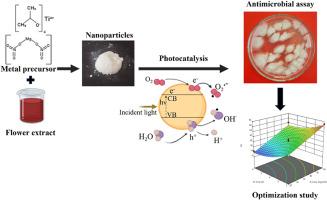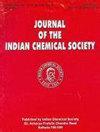利用绿色合成的光催化活性 TiO2、MgO、TiO2/MgO 纳米粒子灭活细菌的研究
IF 3.2
4区 化学
Q2 CHEMISTRY, MULTIDISCIPLINARY
引用次数: 0
摘要
利用马杜鹃(Mahua)花提取物绿色合成了二氧化钛(TiO2)、氧化镁(MgO)纳米颗粒以及由二氧化钛/氧化镁组成的纳米复合材料。在溶胶-凝胶合成法中,桃花提取物被用作还原剂和封端剂。结果表明,绿色还原剂能有效改善绿色纳米粒子的表面结构。利用傅立叶变换红外光谱、X射线衍射、FESEM和紫外可见光谱分析了TiO2、MgO和TiO2/MgO纳米复合材料的成功合成。研究还考察了利用这些纳米粒子通过光催化使大肠杆菌(E. coli)失活的过程。结果表明,这些纳米粒子能有效抑制细菌的生长。使用 Design Expert 的 RSM CCD 模型对所有三种纳米粒子样品的细菌灭活实验进行了优化。优化研究调查了纳米粒子浓度和暴露时间对抑制细菌生长的影响。在浓度为 50 毫克/2 毫升、暴露时间为 2 小时时,TiO2/MgO 的抑菌率 (%I) 最高,为 85.4%,TiO2 为 82.8%,MgO 为 65.14%。本文章由计算机程序翻译,如有差异,请以英文原文为准。

A study on bacterial inactivation using green synthesized photocatalytically active TiO2, MgO, TiO2/MgO nanoparticles
Madhuca longifolia (Mahua) flower extracts were utilised to perform the green synthesis of titanium dioxide (TiO2), magnesium oxide (MgO) nanoparticles, and a nanocomposite consisting of TiO2/MgO. Mahua flower extracts were used as both reducing and capping agents in a sol-gel synthesis method. The effectiveness of the green reducing agent in improving the surface structure of the green nanoparticles was demonstrated. FTIR, XRD, FESEM, and UV vis spectroscopy were employed to analyse the successful synthesis of TiO2, MgO, and TiO2/MgO nanocomposites. A study was done to examine the process of employing these nanoparticles to deactivate Escherichia coli (E. coli) by photocatalysis. The effectiveness of these nanoparticles in inhibiting the growth of the bacterial species was demonstrated. The optimisation of the bacterial inactivation experiment was performed using Design Expert's RSM CCD model on all three nanoparticle samples. The optimisation study investigated the impact of nanoparticle concentration and exposure duration on the inhibition of bacterial growth. The highest levels of percent inhibition (%I) were recorded as 85.4 % for TiO2/MgO, 82.8 % for TiO2, and 65.14 % for MgO at a concentration of 50 mg/2 ml and an exposure time of 2 h. The effectiveness of these nanoparticles in exhibiting inhibition has been limited, indicating their prospective use in the advancement of antimicrobial coatings and other applications, such as disinfectants, in the future.
求助全文
通过发布文献求助,成功后即可免费获取论文全文。
去求助
来源期刊
CiteScore
3.50
自引率
7.70%
发文量
492
审稿时长
3-8 weeks
期刊介绍:
The Journal of the Indian Chemical Society publishes original, fundamental, theorical, experimental research work of highest quality in all areas of chemistry, biochemistry, medicinal chemistry, electrochemistry, agrochemistry, chemical engineering and technology, food chemistry, environmental chemistry, etc.

 求助内容:
求助内容: 应助结果提醒方式:
应助结果提醒方式:


